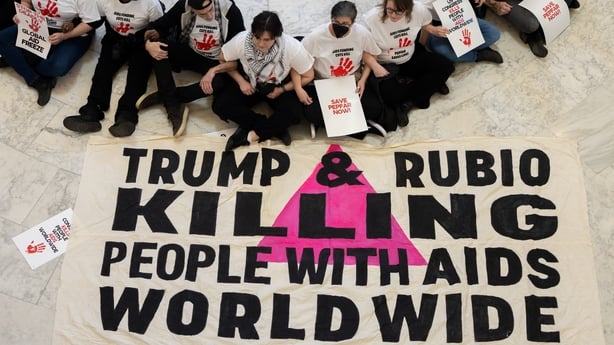A divided US Supreme Court declined to let President Donald Trump's administration withhold payment to foreign aid organisations for work they already performed for the government as the Republican president moves to pull the plug on American humanitarian projects around the world.
Handing a setback to Mr Trump, the court in a 5-4 decision upheld Washington-based US District Judge Amir Ali's order that had called on the administration to promptly release funding to contractors and recipients of grants from the US Agency for International Development and the State Department for their past work.
Conservative Justices Samuel Alito, Clarence Thomas, Neil Gorsuch and Brett Kavanaugh dissented from the decision.
The order by Justice Ali, who is presiding over an ongoing legal challenge to Mr Trump's policy, had originally given the administration until 26 February to disburse the funding, which it has said totaled nearly $2 billion (€1.86bn) that could take weeks to pay in full.
Chief Justice John Roberts paused that order hours before the midnight deadline to give the Supreme Court additional time to consider the administration's more formal request to block the ruling.
The Supreme Court's 6-3 conservative majority includes three justices Mr Trump appointed during his first presidential term.
The court did not provide a rationale for its action.
Read more:
'Millions of lives' from US cuts to TB prevention
With the original deadline lapsed, the court instructed the judge to "clarify what obligations the government must fulfill to ensure compliance with the temporary restraining order, with due regard for the feasibility of any compliance timelines."
The court has a hearing scheduled for tomorrow on the request by the plaintiffs for a preliminary injunction.
The judge has a temporary restraining order currently in place that lasts until 10 March.
Acting Solicitor General Sarah Harris said in a Supreme Court filing on 3 March that blocking the order "is warranted to prevent reinstatement of a new, short-fused deadline that would unlawfully commandeer federal payment processes anew."
Ms Harris argued that the judge's order amounted to judicial overreach and had given the administration too little time to scrutinise the invoices "to ensure the legitimacy of all payments."
Lawyers representing the administration said in a separate 26 February filing that full payments could take weeks.
Aid workers warned of 'irreversible harm'
The Republican president, pursuing what he has called an "America First" agenda, ordered a 90-day pause on all foreign aid on his first day back in office on 20 January.
That order, and ensuing stop-work orders halting USAID operations around the world, have jeopardised delivery of life-saving food and medical aid, throwing global humanitarian relief efforts into chaos.
Aid organisations accused Mr Trump in lawsuits of exceeding his authority under federal law, and the US Constitution by effectively dismantling an independent federal agency and canceling spending authorised by Congress.
Aid organisations said in a Supreme Court filing on 28 February that they "would face extraordinary and irreversible harm if the funding freeze continues," as would their employees and those who depend on their work.
The organisations' "work advances US interests abroad and improves - and, in many cases, literally saves - the lives of millions of people across the globe. In doing so, it helps stop problems like disease and instability overseas before they reach our shores," lawyers for the foreign aid groups wrote.
"The government's actions have largely brought this work to a halt," the lawyers wrote, adding that the Trump administration" comes to this court with an emergency of its own making."

Among the plaintiffs in the litigation are the AIDS Vaccine Advocacy Coalition, Journalism Development Network, international development company DAI Global and refugee assistance organisation HIAS.
The Trump administration had kept the disputed payments largely frozen despite a temporary restraining order from Ali that they be released, and multiple subsequent orders that the administration comply.
The judge's 25 February enforcement order at issue before the Supreme Court applied to payment for work done by foreign aid groups before 13 February, when the judge issued his temporary restraining order.
Amir Ali, who was appointed by Democratic former President Joe Biden, issued his temporary restraining order to prevent irreparable harm to the plaintiffs while he considers their claims.
Mr Trump and his adviser Elon Musk, the world's wealthiest person, have taken dramatic steps to reshape and shrink the federal government.
They have dismantled some agencies, fired thousands of workers, dismissed or reassigned hundreds of officials and removed the heads of independent agencies, among other actions.
As he moves to end American-backed humanitarian efforts innumerous countries, Mr Trump's administration has sent funding termination notices to key organisations in the global aid community.
Global aid groups have said the US retreat endangers the lives of millions of the world's most vulnerable people, including those facing deadly diseases and those living in conflict zones.

